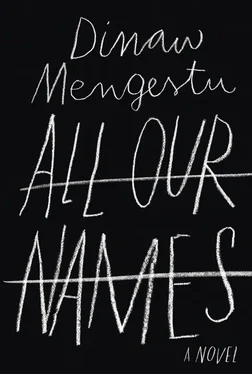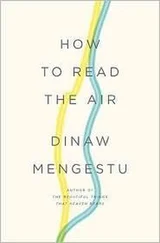“I have a long drive back,” he said. “I’m glad we had a chance to do this.”
He came to where I was sitting and put his hands on my shoulders, as if he knew the last thing I wanted was to stand up.
“If you’re ever in St. Louis, Helen, look me up.” I promised I would. At the time, I thought I would do so first thing in the morning.
Isaac insisted on cleaning up. He said I looked tired and should go to bed, but I wanted to watch him when he thought I wasn’t looking. I could read my mother’s mood by the way she did the dishes. When she was sad, she spent minutes washing and drying each plate before setting it on the rack; that was how Isaac washed the plates that evening.
Later that night, in bed, my hands and then my entire body began to shake; Isaac wrapped his arm around me.
“What’s wrong?” he asked me.
“I’m freezing,” I said.
All evening the apartment had been uncomfortably warm, despite having the windows open in every room. As soon as I said I was freezing, I felt a genuine chill run through my spine, one strong enough to raise the hair on my arms. Isaac tried to comfort me, pressing in close to share his warmth, but the chill was still there. I closed my eyes and told myself to think of hot — not the feeling but the word, in big bold red letters as bright as a warning sign. Just like that, the goose bumps vanished, and I could feel again the humid, almost tropical air of the apartment. Isaac left the bedroom to get another blanket. When he came back, he asked me if there was anything else he could do.
“Yes,” I told him. “Promise me you won’t just disappear one day,” and then, after I felt certain I knew what I really wanted to say, I added, “We’ve gone on like this long enough. You owe me more.”
The next morning, there was an explosion near the center of the capital, followed, that afternoon and evening, by sporadic gunfire in four different neighborhoods. Those attacks had nothing to do with Joseph or his men. I knew because I watched the trail of smoke rising from the center of the capital with him and Isaac from a window on the third floor. Isaac asked Joseph if he knew who was responsible for the blasts and the shooting that followed. Joseph said he didn’t know and didn’t want to find out. “They have nothing to do with us,” he said. “They are amateurs.”
That evening, on the radio, we learned that the amateurs had punched a hole in the post office. They thought it was an important building because of the flag flying outside. Nothing was reported about the shootings.
“They died for nothing,” Isaac said. Joseph disagreed.
“Everything is important,” he said. “It makes the government look weak. It inspires others to follow.”
Joseph wasn’t looking in my direction when he said that, but I felt his words were aimed at me. Was I inspired? I didn’t know yet, but I knew I wanted to be. I was the first one in bed that evening, and the first one awake the next morning. I could honestly claim ignorance of what might have happened during the hours in between.
Not knowing if Isaac had left the room in the middle of the night made the morning easier. Of the half-dozen books I had owned, Isaac had managed to rescue only one from my room. The loss was negligible. I knew the lost books almost by heart, and the same was true for the one with me. I took my copy of Great Expectations into the courtyard and sat near the tree. I didn’t read the book so much as I recited it; I could have gone minutes without looking down at the page and not lost a word, just as I knew my father and uncles must have done with the stories they told me and their own children. The stories were lifeless until they made something out of them, and that was what I did that morning. London was now Kampala; Pip, a poor African orphan wandering the streets of the capital.
The silence that morning lasted until the sun was up and I could smell the onions the maid was cooking in the kitchen. I was just beginning to think of what moves I could make that day to convince Joseph I belonged here when I heard clapping and cheering suddenly erupt from the top floor of the house. The noise alarmed me, perhaps because it had been weeks since I’d heard anything like it, and I worried what it meant until Isaac’s head burst through a window (the room we shared didn’t look onto the courtyard).
“Come to the living room now,” he said. “You have to listen to the radio.”
We met at the bottom of the stairs. Isaac was wearing a dark-purple shirt I had never seen before. He placed the radio on the table in the living room and turned it up loud enough so that everyone in the house, from the maids in the kitchen to the guards at the gate and on the roof, could hear. The president’s morning address was playing on a loop with nothing else allowed to interfere. His voice, as he spoke of the threats to the nation, the attacks on the state, and the emergency measures, from curfews to shoot-on-site orders, was certainly calm. I remember he said that we were all children of the revolution that had liberated Africa and that, as our president, he was determined that we remain free.
By the time Isaac brought the radio down, he had heard the speech several times. He had his favorite moments already: the sunset-to-sunrise curfew, the declaration of a state of emergency. After each one, he punched the table.
“The only real difference now,” he said, “is that it is official. Now they do not have to pretend to have a reason to shoot you.”
I didn’t understand his enthusiasm, but I didn’t fear it, either. I laughed when he did and smiled when I thought I should. I grew confident as I watched him. My feelings about what was happening didn’t change; I had none that I was comfortable with, so as soon as possible I adopted Isaac’s as my own.
“They are scared,” I said.
I felt better saying that.
“More like terrified,” Isaac responded.
“They’re finished.”
“It’ll be over very soon now,” he said.
After a brief silence, the president’s address began again. I wanted to listen to it once more, to see if it was the exact same recording, or if perhaps there weren’t multiple versions of the same words, inflected differently, the better to match the various moods of all those listening: a recording to instill fear, and one to bring comfort; one for the morning, and others for the afternoon and evening, with perhaps a softer, slower version that could be played throughout the night.
We listened to it a second time. Halfway through, I was convinced that Isaac and I had been wrong to speak so boldly about the government’s demise — it was we who were finished. But then there was a slight pause in the speech that I hadn’t heard the first two times — a second, or maybe only a fraction of a second, but long enough to create the image of a man sitting alone in a room rereading the same words out loud — and just like that, I returned to thinking it would be over soon. The government would fall, and we, or someone like us, would rise.
Joseph came downstairs just as it was ending. I was grateful to see him; I didn’t want to listen any longer. Left on my own, I could find too many ways of reading what was happening. With Joseph present, there was only one.
He picked the radio up from the table and turned it off. It was the same shade of gray as the suit he was wearing. I wondered if that was a coincidence, or if Isaac had chosen Joseph’s suit for him.
“This is an important day for us,” Joseph said. “We have to act quickly now.”
He held his hand out to me; I bowed my head before shaking it. I was part of the “we” now.
“How are you with maps?” he asked me.
Isaac put his arm over my shoulder. “He’s a genius,” he said. “He can do anything.”
Читать дальше












